 At the urging of several people, I'm posting this brief reply to the accusations Richard Abanes has made against John MacArthur in an interview Abanes gave to Tim Challies.
At the urging of several people, I'm posting this brief reply to the accusations Richard Abanes has made against John MacArthur in an interview Abanes gave to Tim Challies.My inclination was to ignore the matter until I've had an opportunity to read Abanes's book and evaluate the actual substance of his central complaint against John MacArthur. Unfortunately, virtually all the material referencing MacArthur in the Challies interview is merely innuendo and abusive ad hominem. I don't need to respond to that at all.
But Abanes has also included three broad accusations, which I'll deal with in reverse order as they appear in part 2 of the Challies interview:
- He suggests that MacArthur sinned against Rick Warren by not contacting him personally before criticizing The Purpose-Driven Life.
This is one of the most confusing sections of the Abanes interview. It comes on the heels of a lengthy acknowledgment from Abanes that Matthew 18:15 does not require the critic of a published work to contact the author privately before making his or her criticism public. Yet Abanes also manages to argue that MacArthur was obliged to clear his criticisms with Warren before making them public, because unlike "other critics," who Abanes admits could "never get through to [Warren]," MacArthur "could easily have contacted Warren, as far back as several years ago when MacArthur first started voicing concerns about seeker-sensitive and related issues."
Indeed, as Abanes is clearly aware, MacArthur's biblical objections against "seeker-sensitive" ministry were published and well known for more than a decade before he ever made any public criticism of Rick Warren by name. Which is to say, MacArthur's objections to Warren's pragmatism are biblical, principled, and philosophical objections, not the sort of personal vendetta against Rick Warren Abanes portrays.
Furthermore, Abanes himself made no attempt to contact John MacArthur privately before launching his ad hominem broadsides in the Challies interview. Yet Abanes has more of a relationship with MacArthur than MacArthur has with Warren. MacArthur endorsed a book Abanes wrote in 1995. Abanes personally contacted MacArthur to solicit that endorsement, and received it from MacArthur via a personal letter. Abanes sought a second endorsement from MacArthur on a different book last year. MacArthur was unable to supply the endorsement because he did not have time to read the book before the publisher's deadline. But in the process of seeking the endorsement, Abanes wrote to MacArthur more than once. He certainly knows how to get in touch with MacArthur and "could easily have contacted" him but didn't.
To be clear, I agree with Abanes when he says critics are not obliged to follow the steps outlined in Matthew 18:15-17 before publishing criticism of a Christian leader's published work. So I'm not criticizing Abanes for failing to contact MacArthur. I'm merely pointing out that both his words and his own actions prove that he does not really believe private contact is necessary in such cases. So its very hard to understand his rather forceful criticism of John MacArthur on this point.
Also, the complaint Abanes makes is actually somewhat ambiguous. (Does his reference to "the aforementioned biblical passages" include Matthew 18, or not?). His actual complaint seems to hinge on his assumption that MacArthur was merely repeating "gossip" about Warren's book. That's where the other two complaints come in. - He claims MacArthur "falsely accus[ed] Warrren of things that Warren has never taught," and specifically that he did this on CNN.
A complete transcript of what MacArthur said about Warren "on CNN" is here. The program in question (Newsnight with Aaron Brown, March 16, 2005) included a segment that was, in fact, a rather significant misrepresentation of MacArthur's position. The day after the program aired, I posted a statement on the Grace to You website explaining that the main substance of John MacArthur's complaint about The Purpose-Driven Life had been deleted in the editorial process, and the program was a gross misrepresentation of both what MacArthur said and why he said it.
In other words, MacArthur's comment about Warren's book on CNN was not false, as Abanes alleges. But it was removed from the context where MacArthur had adequately explained what he meant.
To be more specific: MacArthur made only one statement about the content of Warren's book that was not edited out of the segment. MacArthur said, "What you've got is a feel-good kind of approach. This is telling people exactly what they want to hear, telling people that God agrees with you. God wants you to be what you want to be. And this is pretty heady stuff, to tell somebody that the God of the universe wants them to be exactly what they want to be. But that is not the Christian message." MacArthur did not invent that complaint out of thin air, as Abanes seems to think. It was part of a much more lengthy critique of the self-esteemism inherent in statements like "God wants you to be yourself" (p. 103). Abanes may not agree with MacArthur's criticism of that sort of teaching. (I wouldn't expect him to, given his tendency to affirm whatever Warren says and explain away whatever Warren's critics say.) But his outrage here is all out of proportion to the facts. It also seems somewhat hypocritical, given the fact that Abanes is basing his opinion of MacArthur on statements CNN deliberately removed from their context, and Abanes has apparently made no effort to discover what the actual context really was.
Abanes may claim he did not know MacArthur felt his statements on the CNN broadcast were deliberately twisted. If that's the case, he has no excuse, especially since his own main complaint is that Warren's critics are guilty of shoddy research. If he had done a simple Google search for the words "macarthur warren newsnight CNN," Google would have given him, ranked in order, a copy of the Grace to You statement, Tim Challies' next-day analysis of "Newsnight," (complete with a trackback link to Jollyblogger's careful deconstruction of CNN's hack-job on MacArthur), and the original of my statement on the Grace to You website (including a link to Justin Taylor's excellent blogpost, "CNN, John MacArthur, and Slander by Suggestion.")
In other words, the three top links at Google would have put him onto at least five articles showing that MacArthur, not Warren, was the one whose position was distorted by the CNN broadcast—which, after all, did portray The Purpose-Driven Life in an almost completely sympathetic light.
Abanes himself ought to have done the kind of careful research he calls for. Would he still disagree with MacArthur's position? No doubt. But it would be nice to be able to focus on the doctrinal, biblical, and philosophical difference between our different positions, and keep the harsh personal invective out of the discussion.
Finally, - He suggests MacArthur has not done his own research and that someone is "feeding him information" about what Warren has written.
Simply untrue. MacArthur has read both of Warren's major works thoroughly. I have MacArthur's marked-up copy of The Purpose-Driven Church. (I bought him a clean copy and took his annotated one, with his permission.) I've seen his marked-up copy of The Purpose-Driven Life. This sort of baseless conjecture on the part of Abanes is likewise inconsistent with his own call for careful research.
|



 Some people actually watch the undulating waves of fads in the evangelical movement as if these were the best barometer by which to discern how the Holy Spirit is working in the world. Many evangelical leaders actually seem to think the fads are a better gauge than the Word of God for giving us a perspective on what God wants to do in His church from season to season.
Some people actually watch the undulating waves of fads in the evangelical movement as if these were the best barometer by which to discern how the Holy Spirit is working in the world. Many evangelical leaders actually seem to think the fads are a better gauge than the Word of God for giving us a perspective on what God wants to do in His church from season to season.

 Lots of loose ends to gather up and blog about today. I'm writing this post piecemeal, so if it lacks coherence or seems to jump from topic to topic, that's a perfect metaphor for the kind of day this has been. At the end of this rambling post, I'll include some BlogSpotting entries.
Lots of loose ends to gather up and blog about today. I'm writing this post piecemeal, so if it lacks coherence or seems to jump from topic to topic, that's a perfect metaphor for the kind of day this has been. At the end of this rambling post, I'll include some BlogSpotting entries.
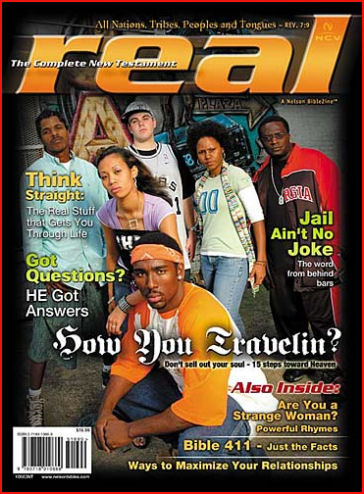
 Virtually all the people on Time magazine's list of
Virtually all the people on Time magazine's list of 

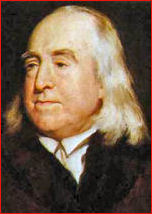
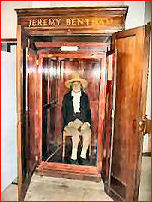
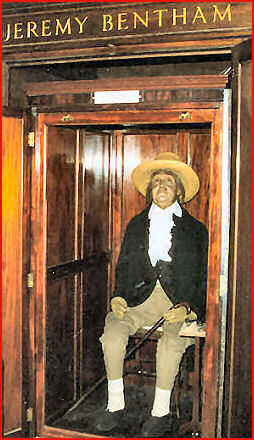 His wishes were followed to the letter.
His wishes were followed to the letter.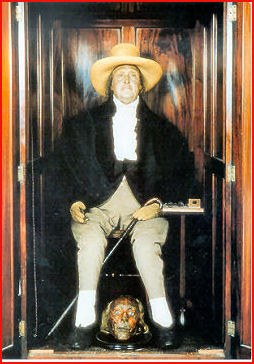 Nowadays, Bentham's actual head is reportedly kept in a vault in a storeroom not far from the corpse, which sits in a hallway at the University College London. But a familiar picture does exist of Bentham's dessicated sconce on display at his own feet.
Nowadays, Bentham's actual head is reportedly kept in a vault in a storeroom not far from the corpse, which sits in a hallway at the University College London. But a familiar picture does exist of Bentham's dessicated sconce on display at his own feet.
 I haven't read any of the Harry Potter books, so I'm not really entitled to much of an opinion about them. I've seen a couple of the Potter movies.
I haven't read any of the Harry Potter books, so I'm not really entitled to much of an opinion about them. I've seen a couple of the Potter movies. OK, I know I was supposed to post the next blog entry on the evangelical disaster Friday night or Saturday. But I've decided to wait.
OK, I know I was supposed to post the next blog entry on the evangelical disaster Friday night or Saturday. But I've decided to wait.
 For the record, I have no sentimental attachment to the term evangelicalism or the visible movement that now employs that name. What's important to me are the principles of historic evangelicalism. I have explained a little more fully what that entails in an article posted
For the record, I have no sentimental attachment to the term evangelicalism or the visible movement that now employs that name. What's important to me are the principles of historic evangelicalism. I have explained a little more fully what that entails in an article posted  For the most interesting and up-to-date firsthand accounts of today's lunchtime "incidents" in the London Underground, see
For the most interesting and up-to-date firsthand accounts of today's lunchtime "incidents" in the London Underground, see 
